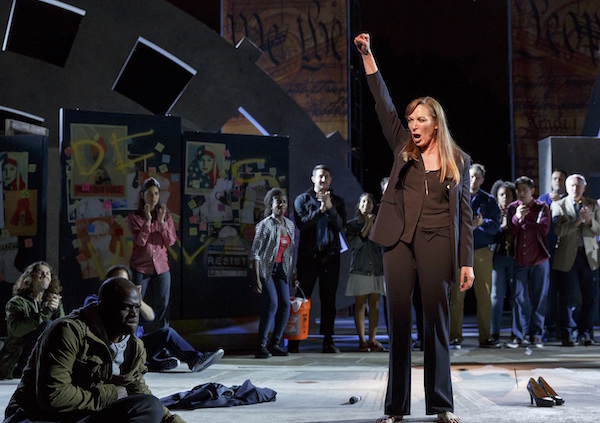 Corey Stoll as Brutus and John Douglas Thompson as Cassius in the Public Theater production of “Julius Caesar.” | JOAN MARCUS
Corey Stoll as Brutus and John Douglas Thompson as Cassius in the Public Theater production of “Julius Caesar.” | JOAN MARCUS
BY CHRISTOPHER BYRNE | Despite the dazzling, thoughtful, and often moving production of “Julius Caesar” now in Central Park, it is virtually impossible to discuss the Public Theater’s staging of the Shakespeare classic without acknowledging the predictably cartoonish controversy it has spawned. In setting the play in the present time and strongly suggesting that Caesar is Donald Trump, director Oskar Eustis and the Public have been accused of taking an irresponsibly anti-Trump stance that, in effect, celebrates regicide in our republic.
Ironically, the right wing complaining and the consequent withdrawal of funding partners speak not to any failing in this production but rather to more stubborn and worrisome failures in our current politics.
Like so many scandals in our culture today, this one reflects reactionary emotionalism, lack of sophistication, and a paucity of intellectual honesty harnessed to trigger outrage… and publicity. But from the first story on Breitbart News to Fox News to the corporate offices of Delta Airlines and Bank of America, I doubt anyone has read or analyzed this play – let alone the Public’s production – burdened by any understanding of context. The knee-jerk reactions and corporate-speak responses certainly support that conclusion. We live in a time where shallow thinking and the cacophony of ill-informed, often factually baseless social media screaming hold a baleful hold on public opinion.
The Public’s provocative production asks political questions we avoid at our peril
It bears remembering, as a first principle here, that artists and audiences keep coming back to Shakespeare because his work is timeless. Its themes resonate so deeply not because they reflect specific moments in history but rather because they speak so cogently to the underlying human condition.
One of Shakespeare’s key themes in “Julius Caesar” – and it could hardly be timelier – explores how a populace can be moved more easily by rhetoric than by reality. Whether in Caesar’s desire to have absolute power – as in Antony’s statement, “When Caesar says do this, it is performed” – or in Antony’s own stirring of the masses in his famous funeral speech, “Friends, Romans, countrymen…,” words are consistently used and manipulated here to create authority. Antony’s words turn the mob against Brutus, even as Brutus has very nearly swayed them to his side. Whether in oration or in tweets, the seeds of power are planted in language, and people easily fall into line, motivated more often by emotion and belief than by reason and facts. This is what both Brutus and Antony count on.
The other salient aspect of the play is its strength as political theater. Both Caesar and Brutus are inflexible partisans, the former pumped up by his extravagant sense of himself and the latter easily manipulated. It doesn’t end well for either or them, and that’s the point of the play — something this production makes abundantly clear. Caesar’s Rome and Elizabeth I’s England in 1599 were both riven by political infighting – conflict between the patrician and the plebian in which those at the top were enriched at the expense of the commons – as well as by fear for the state of the nation.
Sound familiar?
It’s hardly a stretch for Eustis to have set the play in 2017. The director goes so far as to make Marc Antony a woman (the sublime Elizabeth Marvel) in – wait for it! – a pantsuit. And since Antony is the only one who ultimately survives because she is the consummate political operator and, really, formulates the very best words, this may cut too close for reactionary talking heads only too happy to score ratings points with rants that foment the outrage that is a sort of drug their audiences crave to justify their sense of aggrievement.
But if one stops and thinks about “Julius Caesar,” its lesson is that all the characters are, to be blunt, losers. Marc Antony is left to pick up the pieces, but that is hardly winning.
 Elizabeth Marvel as a pant-suited Mark Antony with the cast of the Public’s “Julius Caesar.” | JOAN MARCUS
Elizabeth Marvel as a pant-suited Mark Antony with the cast of the Public’s “Julius Caesar.” | JOAN MARCUS
In addition to Marvel’s masterful performance, which at times is so affecting and passionate that it elicits a visceral reaction – which is what Marc Antony is all about – Corey Stoll, as a conflicted Brutus, gives a focused and exciting performance of a man as corrupt and self-serving as Caesar. Gregg Henry is strong as Caesar, with a mop of hair and overlong tie, and a force to be reckoned with. John Douglas Thompson is excellent as Cassius, who is the real mover behind the scenes and the one who manipulates Brutus for his own ends.
Eustis’ insightful direction captures the scope of the play in an artfully cut version that comes in at just two hours without intermission. The textual economy creates a relentless dynamic suited to today’s audiences. The tightening artfully focuses the story on ambition, the threat of mobs, and, of course, the dichotomy between what we control and what we do not — the iconic tension between the fault in our stars and in ourselves.
Given this riveting production, what is most disturbing about the controversy that has mushroomed is that it represents a convenient orgy of emotionalism and victimhood rather than a deeper examination of what Eustis and the Public are trying to say. To be sure, this production comes out of the mold of political theater and is unabashedly agitprop. The Public is no stranger to political theater; in fact, it’s the organization’s lifeblood. I’ve seen many politically charged Shakespeare productions over the years, all of which, like this one, find fresh nuance and relevance in the 400-year-old texts. (There’s also that little show called “Hamilton” that is not without political theatricality.)
But the Public’s provocations don’t fit neatly into how discourse works in our ravenous media age. Nothing is about discussion and debate. It’s about damning, discrediting, and moving on to the next uproar.
Intellectual life, in the meanwhile, suffers, and the inherently illuminating and didactic elements that have been essential to theater since Aeschylus are reduced to hyperbolic screeds played over and over until the next 140-character wonder comes along.
“Julius Caesar” has a lot to say to us in 2017 about our lives and our culture. Thankfully, the Public remains unafraid to take on that challenge. In Rome at the time of the events, the concern was about the decay of the republic. In 1599 England when it was first seen, fears focused on the sustainability of parliamentary government headed by a monarch. Today, craven power brokers (just like Brutus and Caesar) threaten our democratic institutions and our free press. This is what makes “Julius Caesar” more than merely relevant; it demands that we think about issues abstractly, artistically, and also in real terms.
The Public’s compelling production of “Julius Caesar” shines a light on the conversation we must have as a nation. Trying to shout it down rather than engaging it is reprehensible, shortsighted, and, unrecognized by those fanning the flames, just plain foolish.
JULIUS CAESAR | Delacorte Theater, Central Park | Through Jun. 18: Thu.-Sun at 8 p.m. | Free; ticket distribution details at publictheater.org | Two hrs., no intermission


































